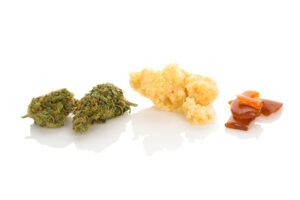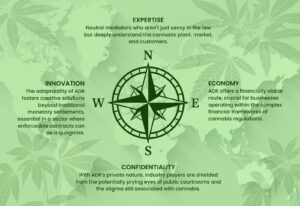
About six months ago, we posted news of the first ever cannabis patent infringement case. As a reminder, the case was initiated by United Cannabis Corporation (“UCANN”) in the United States District Court, District of Colorado against its in-state competitor, Pure Hemp Collective Inc. (“Pure Hemp”). The subject patent is U.S.P. 9,730,911 – “cannabis extracts and methods of preparing and using same,” which generally covers liquid cannabinol formulations using tetrahydrocannabinol (THC), cannabidiol (CBD), and various terpenes (the “911 Patent”).
Just six months into litigation, Pure Hemp has already responded by filing a Counterclaim and Motion for Partial Summary Judgment, which has yet to be heard. These filings have already raised several issues of first impression. While we plan to cover each of these issues on the blog, perhaps the most fascinating question relates to Pure Hemp’s prior art arguments, which could effectively invalidate UCANN’s 911 Patent altogether.
First, let’s back up with a high-level overview of the term “prior art.” In order to successfully obtain a patent, U.S. patent law requires the applicant to demonstrate that the invention attempting to be claimed is both (1) novel, and (2) nonobvious. Both these factors can be overcome by what is known as prior art – public knowledge, usage, or other types of disclosures. The European Patent Office puts it succinctly: “Prior art is any evidence that your invention is already known.”
Here, one of the key issues to be determined is whether the 911 Patent is obvious and could not be considered novel given the long-standing science and technology relating to cannabis extraction and preparation. In its filings, Pure Hemp makes that exact point by arguing that highly concentrated liquid CBD formulations are “ubiquitous” and “were not invented in this millennium.” One of Pure Hemp’s attorneys, Donnie Emmi, was quoted as saying he believed Pure Hemp had a good chance of invalidating UCANN’s 911 Patent if the Court agreed with their analysis.
Of course, it remains to be seen exactly what Pure Hemp plans to offer in support of its prior art argument. Typically, defendants in patent litigation produce years, sometimes decades, of scientific articles and other writings to demonstrate a given industry’s preexisting research and knowledge. It’s clear this wealth of evidence likely doesn’t exist for Pure Hemp given the general illegality of marijuana to date. This means the prior art could definitely be out there, but hard to definitively prove given that it was driven underground.
It’s also clear that that is about to drastically change for the cannabis industry. With marijuana now partially legalized in thirty-three states, each and every business is clamoring to get its newest formulations of cannabis patented before a competitor. The number of patents issued by the U.S. Patent and Trademark Office has more than quadrupled since 2016. It’s also worth noting that the parties are represented by reputable patent attorneys, and the Court seems to be paying close attention. This case will no doubt clarify and shape the field of cannabis patent litigation for years to come. Stay tuned!
























